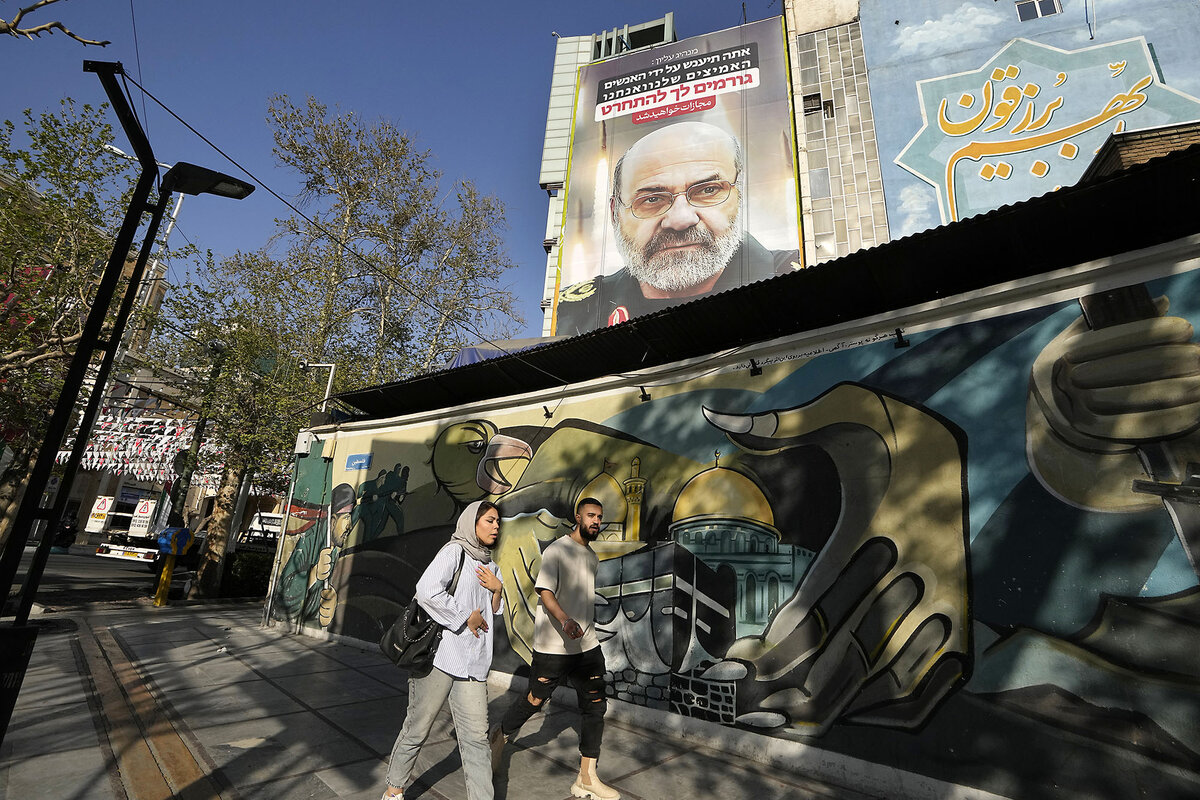In words and deeds, US seeks Israeli restraint after Iran’s attack
Loading...
For one excruciatingly tense moment in the White House Situation Room, all present from President Joe Biden to Cabinet members and senior aides seated around the large table were holding their breath.
As part of its unprecedented aerial attack on Israel Saturday night, Iran had simultaneously launched more than 100 ballistic missiles. Everyone present knew the weapon was capable with just one successful hit of causing tremendous loss and damage – and of turning the war in Gaza into a broader regional conflict of unforeseen consequences.
Would Israeli air defense systems – and the combined assets of the international coalition led by the United States that had been scrambled to defend Israel – be up to the task of thwarting more than 300 drones and missiles?
Why We Wrote This
A story focused onWith a muscular and collaborative defensive effort to help deflect Iran’s missile barrage, the Biden administration is hoping its message of “ironclad support” for Israel can prevent the escalation of the Gaza war into a regional conflict.
In the end, Israel came through Iran’s attack almost unscathed – a result that demonstrated both Israel’s and its partners’ military superiority and unrivaled coordination.
But above all, it was the thwarting of those ballistic missiles that underscored the critical nature of Israel’s support from international partners as it navigates heightened tensions in a hostile neighborhood.
Participating in that defensive umbrella were the U.S. and other partners, including the United Kingdom and France, with assistance, remarkably, from some of Israel’s Arab neighbors including Jordan and even to some extent Saudi Arabia.
And it is this display of international solidarity – and what President Biden calls “ironclad support” – that the U.S. and others hope Israel will weigh heavily as it contemplates how to respond to the attack from Iran and its proxies, including Hezbollah.
“Nobody wants to run up the escalation ladder,” a senior White House official told journalists in a briefing Sunday. Repelling Iran’s attack “was an extraordinary feat of military prowess and participation of coalition partners,” the official continued. “Going forward, we all need to take that into account and think that through.”
“Take it as a win”
Indeed, that is one part of the message Mr. Biden communicated to Israeli Prime Minister Benjamin Netanyahu in the phone conversation they held as the attack appeared to be over. “Take it as a win,” the president said.
Iran had signaled for nearly a week that it was preparing to retaliate against Israel in some manner for the April 1 attack on Iran’s diplomatic mission in Damascus, Syria, that killed three Iranian generals – including Brig. Gen. Mohammad Reza Zahedi, a senior Islamic Revolutionary Guard Corps commander charged with directing Iran’s proxies in the fight with Israel.
Iran’s failure to cause any significant damage to Israel constituted a loss for Tehran, some analysts say. Others say the Iranian regime accomplished what it intended by demonstrating that it could attack Israel from its territory, along with the participation of proxies in numerous other countries, including Lebanon, Iraq, Syria, and Yemen (via the Iran-aligned Houthis).
But Mr. Biden also underscored to Mr. Netanyahu that the same decisive U.S.-led international support and participation would not be there if Israel decided to retaliate against Iran in a manner that risked plunging the region into a broader conflict no one wants.
That leaves Israel to weigh a historical inclination to show strength and retaliate forcefully in response to any aggression, against the importance of maintaining this “ironclad” international support. Before Iran’s attack, that support was weakening over Israel’s punishing assault on Hamas in Gaza and Palestinian civilians there.
Among the factors that diplomats and international analysts say Israel will have to consider are two key ones. First, can Israel afford not to respond in kind to Iran’s first-ever direct attack on Israel – an attack that, even if unsuccessful, demonstrated Iran’s ability and willingness to go head-to-head with its adversary?
“I think there’s no question the Israelis are going to be compelled to respond to what was the first direct attack by the Islamic Republic on the Israeli mainland,” says Andrew Tabler, a senior fellow in Arab politics at the Washington Institute for Near East Policy who served on the National Security Council of former President Donald Trump.
“But do they have to do something right away and big, like bombing Iran’s nuclear facilities? No,” he adds, “the Israelis have time on their hands.”
Second, does maintaining international support outweigh a tenet of Israeli defense policy since the country’s founding, which is to retaliate for every attack, sometimes with even greater force?
Israel weighing US request
There were some early signs that Israel was at least weighing Mr. Biden’s admonition as it considers its next steps.
Demands Sunday from some members of Israel’s war Cabinet to proceed to immediate retaliatory strikes against Iran were put off, according to Israeli press reports. The war Cabinet met again Monday and reportedly was reconvening Tuesday, suggesting any decision was not final.
Axios reported Monday that Israeli Defense Minister Yoav Gallant told U.S. Defense Secretary Lloyd Austin in their phone call Sunday that Israel would be compelled to respond – especially given that ballistic missiles were included in the munitions barrage.
But Mr. Gallant also said the moment presents an opportunity to create a strategic alliance to counter Iran, according to the report.
Israel could decide to take a path forward somewhere between launching a direct strike on Iran that would risk escalation and doing nothing, some analysts say.
“The Israelis don’t want to get into a spiraling tit-for-tat confrontation with Iran, especially given that they are already fighting one war in Gaza and giving it all they’ve got, so that may create some room for prudence,” says Benjamin Friedman, policy director at Defense Priorities, a Washington think tank promoting U.S. foreign policy focused on national security interests.
“They may have to say they’re going to respond, but then they might proceed with some of the same low-level actions they’ve carried out against Iran for years,” he says – such as targeting Islamic Revolutionary Guard Corps officers and assassinating Iranian nuclear scientists.
Yet while Mr. Friedman says he was relieved to see President Biden temper his “ironclad support” with a warning that the U.S. would not support a direct strike on Iran, he also worries it may have been too little, too late.
“I would have preferred that the president make this conditional support clearer back in the bear-hug days” following Hamas’ Oct. 7 attack. Now an unwillingness to define the limits of U.S. support earlier, he adds, could leave Israel thinking that in the end it will have that “ironclad” support no matter how it responds to Iran.








